Table of Contents
ToggleIntroduction
Who would have thought that the word ‘cloud’ would one day become synonymous with on-demand virtual computing services? Cloud computing has come a long way since the launch of Amazon Web Services (AWS) in 2006 and Google Cloud in 2008. Cloud services provide businesses and organizations with shared computer processing resources and data demand. The global cloud computing market was valued at USD 483.98 billion in 2022 and is expected to grow at a CAGR of 14.1% from 2023 to 2030. This puts great emphasis on evaluating the top cloud computing service providers — Google Cloud and AWS. This blog gives a comprehensive overview of both and elaborates on their features, benefits, and applications.

Don't miss out on your chance to work with the best!
Apply for top job opportunities today!
What Do Cloud Computing Platforms Do?
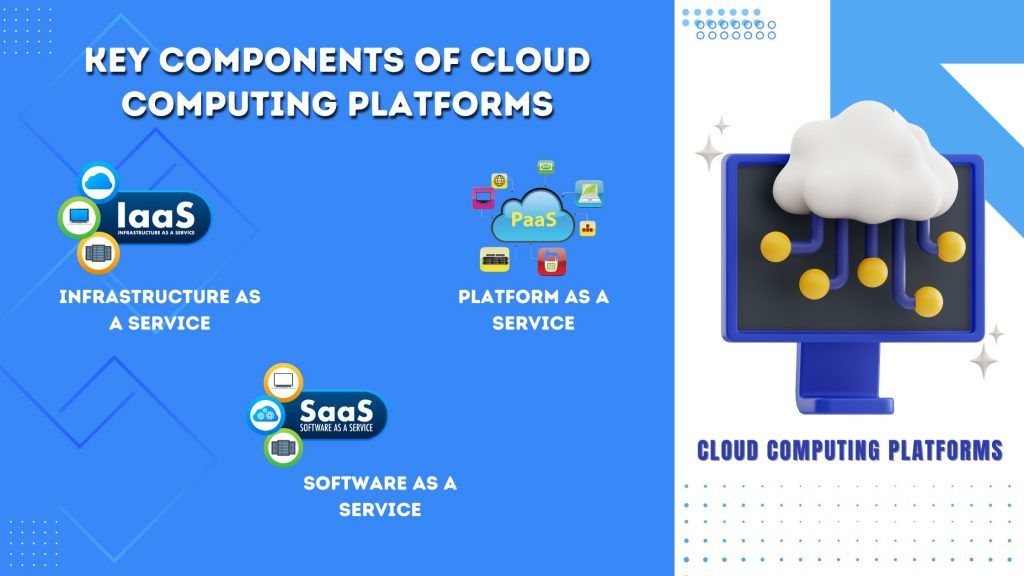
Gartner’s recent research indicates that cloud computing will be used widely by 2027. It will not just be a technology platform, but also serve as the key driver for business innovation. In simple words, cloud computing platforms are virtual environments offering a range of cloud services that include computing power, storage, databases, networking, analytics, and machine learning. The key components of cloud computing platforms can be categorized as follows:
- Infrastructure as a Service (IaaS): It offers virtualized computing resources over the Internet. IaaS allows users to rent virtual machines, storage, and networking components.
- Platform as a Service (PaaS): It is a platform that includes development tools, services, and infrastructure that help with application development and deployment.
- Software as a Service (SaaS): It eliminates the need for users to install, manage, and maintain the software locally. SaaS delivers software applications over the internet on a subscription basis.
With cloud computing platforms, businesses and individuals can scale resources easily, enhance flexibility, and reduce the complexity of managing physical infrastructure. Amazon Web Services (AWS), Microsoft Azure, Google Cloud Platform (GCP), and IBM Cloud are examples of prominent cloud computing platforms.
What is Google Cloud Platform?
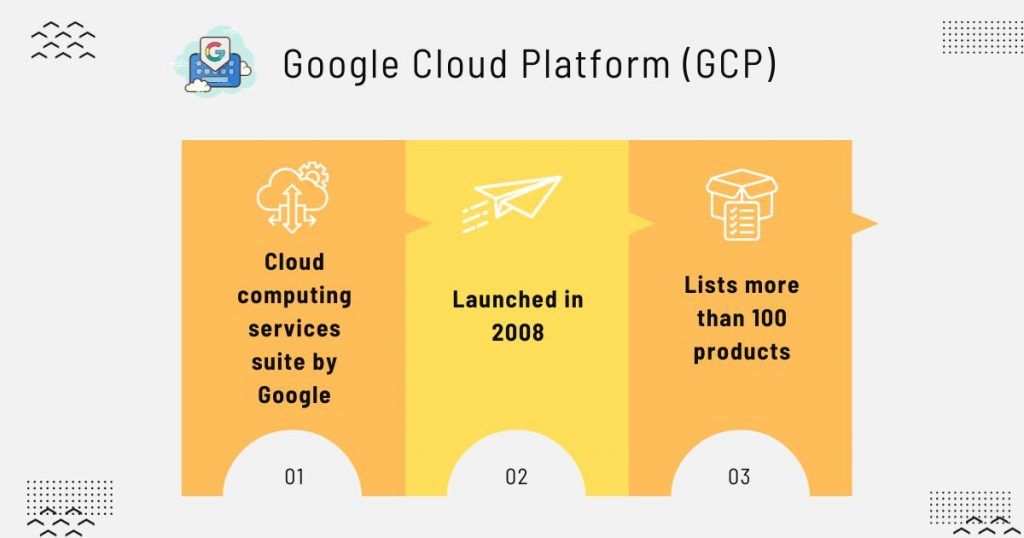
The Google Cloud Platform (GCP) is a cloud computing services suite by Google. It offers a range of services for computing, storage, machine learning, data analytics, networking, and more. It was launched in 2008 and today lists more than 100 products under the Google Cloud brand. Google Cloud offers infrastructure as a service, platform as a service, and serverless computing environments. It is operated on the same infrastructure that Google uses for Google Search, Gmail, and Google Docs.
What is Amazon Web Services (AWS)?
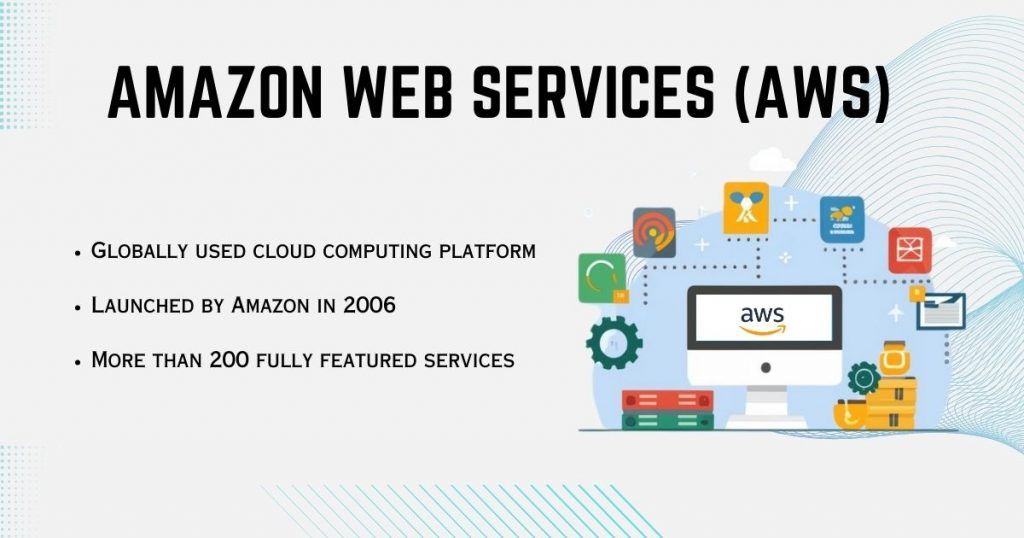
Amazon Web Services (AWS) was launched by Amazon in 2006 to provide on-demand cloud computing platforms and APIs. It is a globally used cloud computing platform that offers more than 200 fully featured services from data centers globally. The different types of cloud services offered by AWS include computing power, storage, databases, machine learning, and analytics. Customers use AWS to enhance innovation, lower costs, and become more agile. The platform’s customers include startups, enterprises, and leading government agencies.
Key Features of Google Cloud
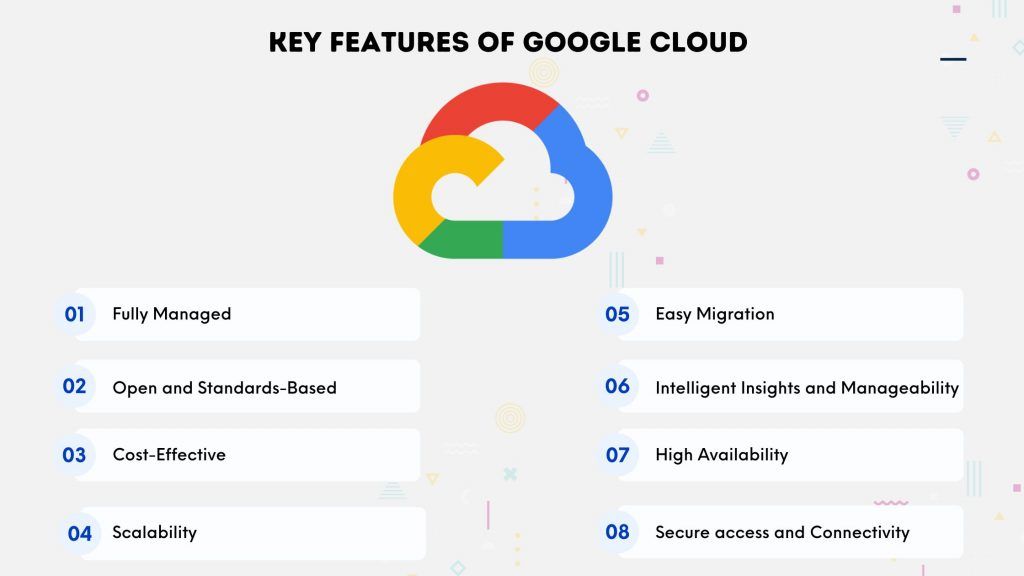
Fully managed
Businesses operated on Google Cloud can run without disruption with Cloud SQL, which manages databases for its users. Cloud SQL automates all your backups, replication, patches, encryption, and storage capacity increases. This makes applications reliable, scalable, and secure.
Open and Standards-Based
The open standards embraced by Google Cloud ensure compatibility and interoperability with existing technologies. It also supports popular programming languages, frameworks, and industry standards and promotes flexibility and collaboration.
Cost-Effective
Google Cloud’s pay-as-you-go pricing model allows users to pay for the resources they consume without upfront costs. Moreover, sustained use discounts and committed use discounts are features that provide cost savings for sustained and predictable workloads.
Scalability
You can scale applications dynamically on demand with Google Cloud, which ensures optimal performance. Services like Compute Engine and Kubernetes Engine support flexible and scalable architectures.
Easy Migration
You can easily migrate applications and data from on-premises environments to Google Cloud. Migrate for Compute Engine and Database Migration Service are services that help with seamless migrations.
Intelligent Insights and Manageability
Users can get real-time insights into application performance and operational health with Cloud Monitoring and Cloud Logging. Google Cloud’s operations suite enables effective management and monitoring of cloud resources.
High Availability
Google Cloud has a global infrastructure that ensures high availability of services and applications. Services like Cloud Load Balancing and Multi-Regional deployments make it possible to have improved availability.
Secure access and Connectivity
With network security features like Virtual Private Cloud (VPC) and Identity-Aware Proxy, it is possible to have secure access and connectivity. Further, Google Cloud offers dedicated interconnects and VPNs, which enhance network security.
Key Features of Amazon Web Services (AWS)
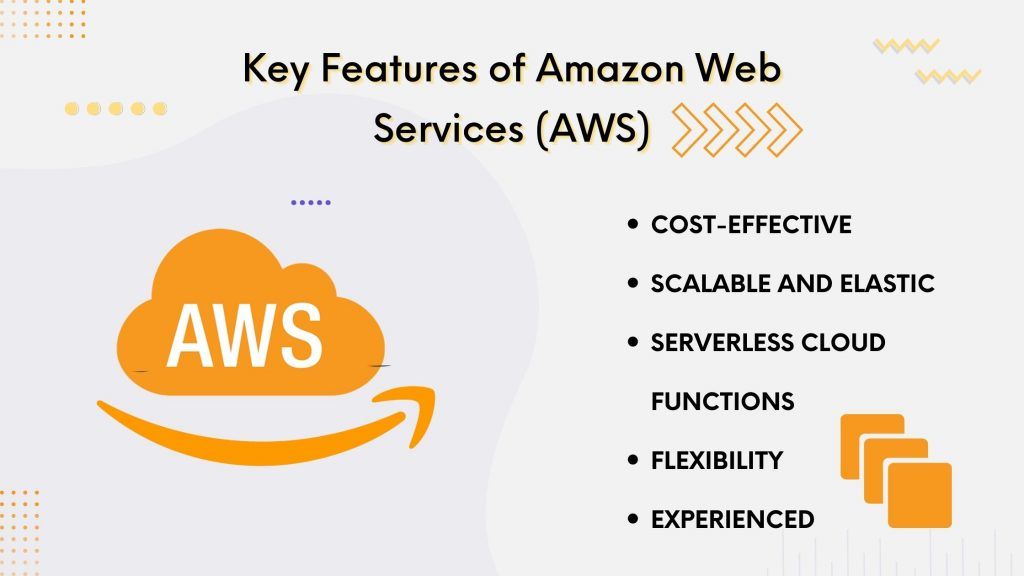
Cost-Effective
AWS follows a pay-as-you-go pricing model, which helps with effective cost management. Users can pay only for the resources they consume. In addition, the AWS Cost Explorer helps users analyze and optimize their spending. AWS also offers reserved Instances and Savings Plans to promote cost savings for predictable workloads.
Scalable and Elastic
AWS can be scaled up or down as per varying workloads. This Auto Scaling allows users to adjust resources based on demand, ensuring optimal performance. Further, users can distribute incoming traffic across multiple instances with Elastic Load Balancing. This enhances application availability and fault tolerance.
Serverless Cloud Functions
With AWS Lambda, it is possible to have serverless computing. This feature allows developers to run code without provisioning or managing servers. As Lambda scales automatically in response to triggered events, AWS is a great choice for event-driven architectures.
Flexibility
AWS allows developers to select from a vast selection of operating systems, programming languages, frameworks, databases, and architectures. One can choose from multiple deployment options, including virtual machines (EC2), containers (Elastic Container Service), and serverless (Lambda).
Experienced
Amazon’s diverse customer base ranges from startups as well as big enterprises. This strengthens AWS’ status as one of the pioneers in cloud computing and a service provider known for its cloud infrastructure.
Google Cloud vs AWS: Comparison Table
| Features | Google Cloud | Amazon Web Services |
|---|---|---|
| Computing Services |
|
|
| Database Services |
|
|
| Storage Services |
|
|
| Management Services |
|
|
| Network Services |
|
|
| Customization of instances | A wide range of customization available for any Instance | Limited customization available |
| Pricing | Google charges per minute basis | Amazon charges per hour basis |
| Cost | Comparatively cheaper. No time limit for Google free tiers. $300 worth of credit provided by GCP can be used across all services | Comparatively expensive. Amazon free tiers have a 12-month validity and later charges as per usage |
| Downtime | More downtown time reported compared to AWS | Less frequent downtime |
| Big data support | It has an AI First big data analysis tool | The big data analysis tool is AWS Lambda |
| AI/ML Support |
|
|
| Availability | Available globally in 29 geographic regions and 88 zones | Available in 26 geographic regions and 84 zones worldwide |
| Notable customers |
|
|
When to choose Google Cloud and when to choose AWS?
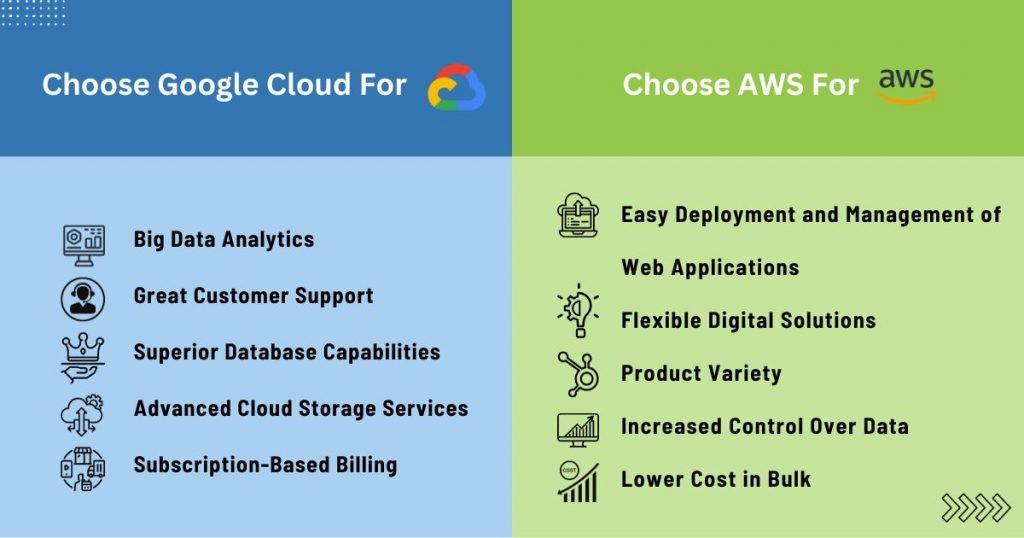
Choose Google Cloud For
- Big Data Analytics
- Great Customer Support
- Superior Database Capabilities
- Advanced Cloud Storage Services
- Subscription-Based Billing
Choose AWS For
- Easy Deployment and Management of Web Applications
- Flexible Digital Solutions
- Product Variety
- Increased Control Over Data
- Lower Cost in Bulk
Google Cloud vs AWS: Which one to choose in 2024?
Both Google Cloud and AWS are cloud services that offer internet-based computing. Whether you run a startup or are a seasoned enterprise, both service providers offer services like Infrastructure as a Service (IaaS), Platform as a Service (PaaS), and Software as a Service (SaaS) products. The choice between Google Cloud and AWS depends on specific requirements. A good understanding of the key differences based on database options, computing services, networking and storage features, and overall security features and services. Google Cloud excels in big data analytics, customer support, and advanced storage, while AWS stands out for its flexibility, diverse product offerings, control over data, and cost-effectiveness at scale. The choice between them depends on specific business requirements, preferences, and the desired cloud ecosystem.
FAQs
Google Cloud and AWS provide scalable and on-demand resources, allowing users to pay only for what they use rather than investing in fixed infrastructure.
Google Cloud is a great choice for simple and innovative projects focused on big data analytics and machine learning.
AWS is suitable for projects that need easy deployment of web applications, flexibility, a diverse set of digital solutions, and control over data.
Yes. Both platforms offer tools and services for seamless migration. However, the ease of migration depends on specific requirements and the existing infrastructure.
Take control of your career and land your dream job!
Sign up and start applying to the best opportunities!


